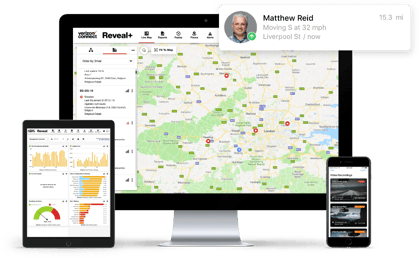9 Secrets to Reducing your Fleet Expenses
As a fleet owner, your day-to-day costs can quickly add up. What you don’t know is there are further hidden, expensive...
Read more
As we reach the end of 2021, what better time to look back at the topics that grabbed the attention of fleet-reliant businesses over the past 12 months.
It’s safe to say we’re waving goodbye to another eventful year. On top of the usual challenges that come with running a fleet, business owners had to contend with the fallout of Brexit, fuel shortages, and of course, a certain virus.
So, as we prepare for the year ahead, let’s re-examine the lessons of the one gone by, starting with…
With much of Europe back under lockdown conditions in January, COVID-19 continued to cause concern among fleet-reliant businesses. Over half of fleet managers said the virus impacted service levels and interrupted supply chains.
In response, 51% adopted new tools to drive greater efficiency, while 49% said they could not have maintained business continuity without a fleet management solution in place.
Find out how COVID-19 impacted businesses like yours.
On the 31st January 2020, the UK officially left the European Union, marking the most significant change to fleet and haulage regulation in recent memory.
One year on, we looked at how fleets were coping with the changes and how fleet management tools can help to manage potential delays and disruption. Data gathered on critical events such as site arrival and departure time, and time-on-site can reduce paperwork and improve process accuracy.
Monitoring wasteful practices such as idling and speeding can also help fleet managers to increase agility, which is much needed during times of disruption. Look back at our featured article to find out how.
With so much change afoot, compliance was always a hot topic among fleet managers in 2021. And as winter made way for spring, we looked at the challenges many business owners face when enforcing and monitoring driver break and rest periods.
With the Verizon Connect Fleet Manager Insight Survey finding almost one in five worry that drivers are not taking adequate rest breaks, we published an eBook examining how best to manage tacho breaks and reduce driver fatigue.
Electric vehicles have been much-discussed among fleet-reliant businesses for some time now. But 2021 felt like a significant turning point in their adoption.
Almost two-thirds of surveyed fleet managers say they would implement EVs across their fleet to save costs, while over half say they would do the same to meet increasingly ambitious emissions targets.
And the benefits don’t stop there. EVs can help fleet-reliant businesses reduce waste, carbon footprints and unnecessary mileage and much more. Here’s how.
Improving the lives of drivers is important all year round, so this summer we explored the benefits of fleet management technology for those behind the wheel.
Data collection and live location information can benefit drivers in many ways. For one, a comprehensive solution can automatically reroute drivers by combining live traffic and GPS data to suggest the most efficient route they could take from A to B.
Fleet management systems can also help remove distractions and reduce time-consuming processes. Data gathered on start/finish time and site arrival and departure time can populate timesheets, payroll and billing automatically.
Fleet managers are very used to dealing with fluctuating fuel prices, but in autumn this year, petrol and diesel shortages left many businesses facing enforced downtime.
While there is little fleet-reliant businesses can do to influence market and political forces, there are plenty of steps that can help to reduce waste, improve MPG and keep vehicles moving.
As we explored at the time, there are many ways that fleet management technology can help to lower fuel consumption and spend. By monitoring instances of idling and speeding, you can coach drivers into more economical behaviours. Integrating fuel cards and controlling personal use can also aid fuel efficiency.
The popularity of dashcams has increased significantly in recent years. But, as we explored in our October eBook, there’s more to a video solution than a camera in the cab.
With an integrated video system, you get greater context around harsh driving incidents – giving you vital evidence in the event of an accident or insurance claim and a valuable tool for coaching your drivers.
Plus, when you add asset tracking capabilities to your fleet management and video solution, you get total visibility of your fleet – helping you make faster, smarter and more profitable decisions.
Towards the end of the year, the nights close in and the temperatures drop - both of which can present challenges to busy fleet managers and drivers.
As always, Verizon Connect is on hand with helpful tips and advice to keep your teams moving during the winter months. From checking tyre pressure and fluid levels to packing emergency bags and running checklists, there are plenty of steps you can take to stay safe when out on the road.
For a look back across all the topics we covered in 2021 and beyond, browse the resources section of the Verizon Connect website.
Tags: All




Find out how our platform gives you the visibility you need to get more done.
As a fleet owner, your day-to-day costs can quickly add up. What you don’t know is there are further hidden, expensive...
Read moreVerizon Connect Reveal tracks the fleet data that can have a big impact on your business. These are things like where...
Read moreAt Verizon Connect, we can only provide the highest possible level of service to fleet managers and business owners by...
Read moreReveal tracks the fleet data that can have a big impact on your business. These are things like where your vehicles are...
Read more